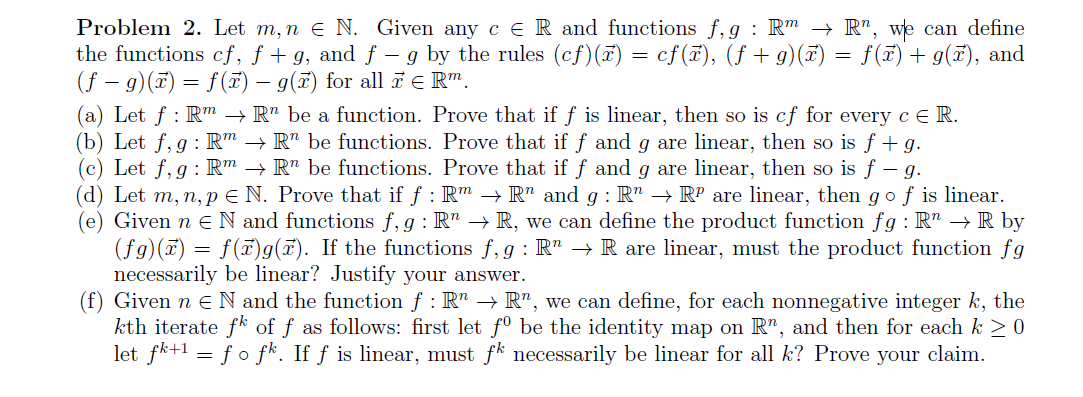Given n e N and the function f : R" → R", we can define, for each nonnegative integer k, the kth iterate fk of f as follows: first let fº be the identity map on R", and then for each k > 0 let fk+1 = f o fk. If ƒ is linear, must fk necessarily be linear for all k? Prove your claim.
Given n e N and the function f : R" → R", we can define, for each nonnegative integer k, the kth iterate fk of f as follows: first let fº be the identity map on R", and then for each k > 0 let fk+1 = f o fk. If ƒ is linear, must fk necessarily be linear for all k? Prove your claim.
Algebra & Trigonometry with Analytic Geometry
13th Edition
ISBN:9781133382119
Author:Swokowski
Publisher:Swokowski
Chapter5: Inverse, Exponential, And Logarithmic Functions
Section5.6: Exponential And Logarithmic Equations
Problem 64E
Related questions
Question
Part (f) only as soon as possible

Transcribed Image Text:Problem 2. Let m, n E N. Given any c e R and functions f,g : R™ → R", we can define
the functions cf, f + g, and f – g by the rules (cf)(ï) = cf(ï), (f + g)(ï) = f(7) + g(ï), and
(f – 9)(7) = f(F) – g(7) for all 7 e R™.
(a) Let f : R" → R" be a function. Prove that if f is linear, then so is cf for every c e R.
(b) Let f, g : R™ → R" be functions. Prove that if f and g are linear, then so is f +g.
(c) Let f, g : R™ → R" be functions. Prove that if f and g are linear, then so is f g.
(d) Let m, n, p E N. Prove that if f : R™ → R" and g : R" → RP are linear, then gof is linear.
(e) Given n EN and functions f, g : R" → R, we can define the product function fg : R" → R by
(fg)(F) = f(ï)g(F). If the functions f,g : R" → R are linear, must the product function fg
necessarily be linear? Justify your answer.
(f) Given n e N and the function f : R" → R", we can define, for each nonnegative integer k, the
kth iterate fk of f as follows: first let fº be the identity map on R", and then for each k > 0
let fk+1 – f o fk. If f is linear, must fk necessarily be linear for all k? Prove your claim.
Expert Solution
This question has been solved!
Explore an expertly crafted, step-by-step solution for a thorough understanding of key concepts.
Step by step
Solved in 2 steps

Recommended textbooks for you

Algebra & Trigonometry with Analytic Geometry
Algebra
ISBN:
9781133382119
Author:
Swokowski
Publisher:
Cengage

Algebra & Trigonometry with Analytic Geometry
Algebra
ISBN:
9781133382119
Author:
Swokowski
Publisher:
Cengage